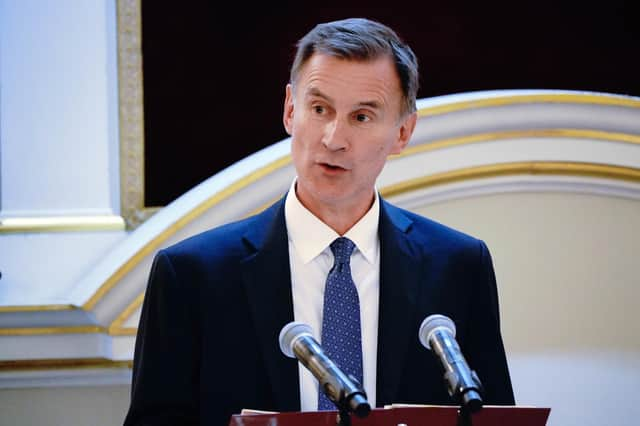‘Impossible to cut tax’ – Can we believe anything that Jeremy Hunt says?


As is usual with our governments who, at least since the days of Blair are more concerned with manipulating the media message to manage public expectations rather than deal honestly, it is impossible to know where the truth lies. And when you have the government’s allegedly independent forecaster, the Office of Budget Responsibility, getting its estimates repeatedly wrong, how can the Chancellor know if he is even being honest with himself?
If there is anyone who genuinely believes Jeremy Hunt is going to cut personal taxes in the forthcoming Autumn Statement on 22 November I am yet to find that individual. For Hunt the overriding political priority is to help get the government of Rishi Sunak re-elected – and this requires a number of economic messages and outcomes to be achieved over the next six months, through to his Budget statement in March.
Advertisement
Hide AdAdvertisement
Hide AdOne message being crafted is he (and therefore this version of a Conservative Government) is a safe pair of hands. Hunt will therefore want to be seen as thoughtful, not rash; prudent, not reckless; equitable, not unjust. After the experience of Liz Truss’s tax cuts being reversed on the back of supposed market sentiment believing they were un-costed and therefore unaffordable – introducing a tax cut now has more hurdles to pass through.
A secondary message Hunt will want to put over is despite his caution he does believe in cutting taxes in the medium to long term. This is important to give hope to the Conservative electoral base so it might come out and vote rather than stay at home – and more generally build a point of differentiation with the Labour Party that has in recent weeks said it now has no plans to introduce new wealth taxes or raise taxes in general.
Such messaging has to be seen in the context of polling showing Labour is now more trusted on the economy than the Conservatives, with 25% believing Keir Starmer’s party would do a better job than the 21% believing Sunak’s party would.
No surprise then that Jeremy Hunt is presenting the first message that he has to consider the state of the public finances and the impact of financing the national debt before he can sanction tax cuts. There is nothing wrong with this approach but he neglects to balance it by saying enough about reducing the cost of governments that always add to the national debt.
Yes, kites are being flown about cutting back on the high speed rail link to from Birmingham to Manchester, or raising future benefit payments by less than inflation, but thus far the government has shown little capacity for taking the tough economic decisions it talks about.
The best time for “tough decisions” is immediately after a general election, not the remaining fourteen months running up to one. Especially so, when a party has been in power for approaching fourteen years and was responsible for pushing ahead with projects such as HS2 and allowing the Bank of England to let inflation rip through the economy.
Instead of making feints about being prudent so taxes might be cut in future, the Chancellor needs to show some evidence he means what he says and he can do this by making genuine cuts in public expenditure now, announcing a thorough review of expenditure prior to the March Budget and cutting taxes now that will increase revenues.
I have argued here before that although cutting personal taxes should be an economic and political goal, it is cutting business taxes first that should be given priority. Top of the list should be reversing the highly damaging abolition of tax-free shopping for tourists which the CEBR estimates is costing £10.7bn in lost GDP and two million visitors a year.
Advertisement
Hide AdAdvertisement
Hide AdDubbed the tourist tax by manufacturers and retailers of luxury and premium goods, it has had a serious impact on sales of rare Scotch whiskies to watches and jewellery, fashion items and accessories – and of course the hotel and hospitality trade that provides tourists with accommodation and entertainment.
While London is the top tourist destination the economic hit is spread around the UK, as tourists visit all corners of our country, not least Edinburgh, Glasgow and on to the highlands and islands.
The shameful irony is that exclusive British goods are now being bought in Dubai, Paris and New York instead of retail outlets across the UK – with the tax revenues going to treasuries of foreign governments when we could be benefitting from them instead. It is a singular act of self-harm that would be politically cost-free to reverse and would send a signal the Government listens and has the nous and humility to correct a mistake of its own making.
Raising the current threshold of £85,000 at which VAT registration takes place could also be a welcome fillip for small businesses. Growing businesses caught in the threshold area – where raising turnover suddenly incurs significant administrative time and cost on becoming the treasury’s tax collector – causing some to do their level best to remain under it. If Chancellor Hunt wants to encourage economic growth immediately, raising the starting point to at least £100,000 should be announced in November.
As a commitment for next year’s budget another means of signalling genuine intent would be to announce a target of raising other thresholds of various taxes rather than freezing them so that inflation no longer introduces de facto tax rises by stealth.
He could then finish off his forward thinking by announcing as part of a reduction in government duplication and waste – the abolition of the OBR – an institution by its own performance simply not fit for purpose.
